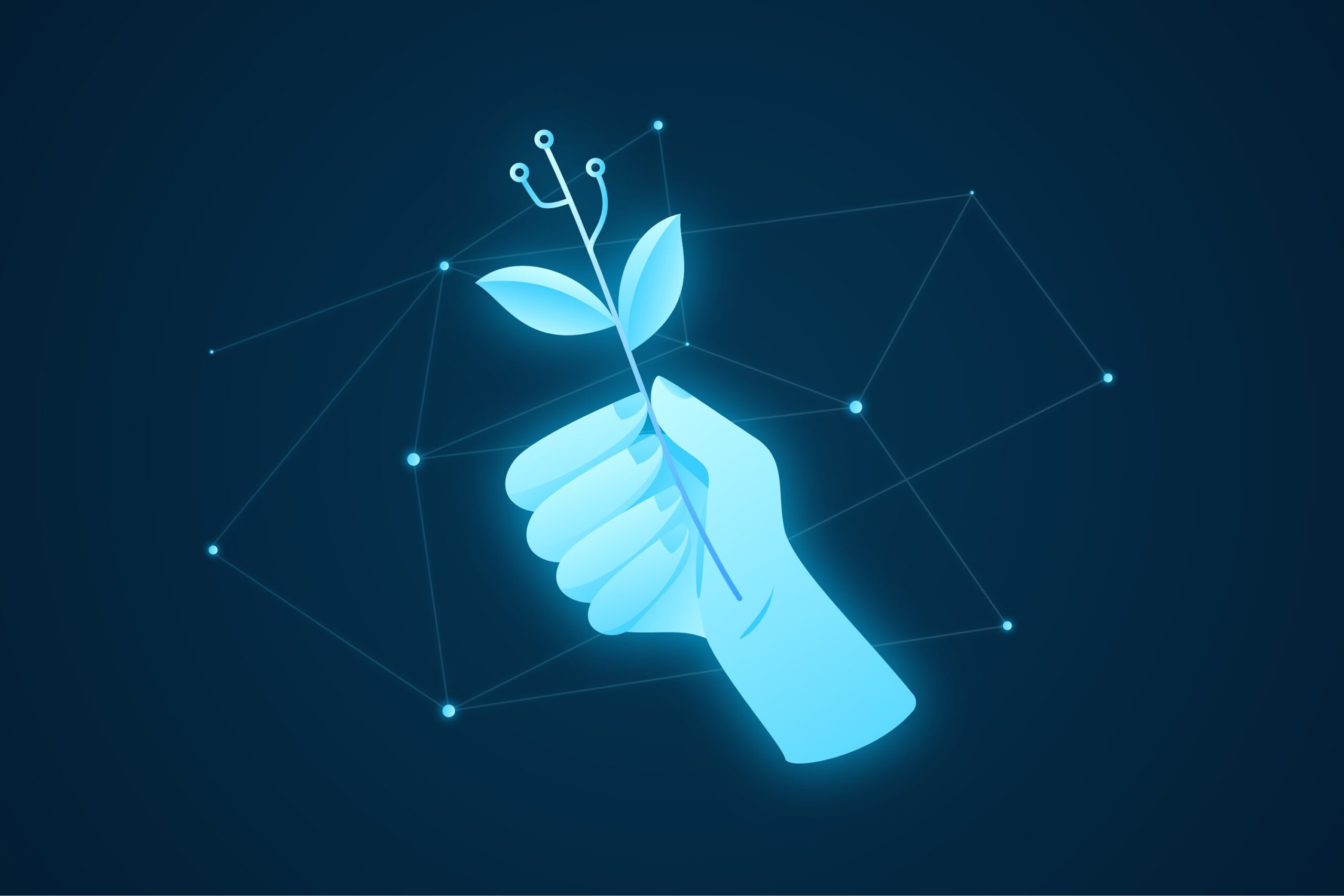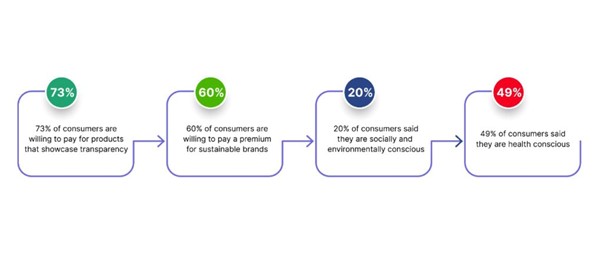Contact: +91 99725 24322 |
Menu
Menu
Quick summary: Discover how blockchain technology is revolutionizing sustainability, driving transparency, compliance, and trust in green initiatives for a more sustainable future.

Blockchain for sustainability, a journey that is transparent, verifiable, and free from the fear of greenwashing. That’s the promise of blockchain technology—a game-changer for businesses striving to make a real impact on the planet. But many companies still struggle with trust and transparency in their green initiatives. Blockchain not only addresses these pain points but also empowers organizations to achieve their sustainability goals with confidence and clarity.
Zion Market Research forecasts that the worldwide blockchain technology market for supply chain management will hit $3.15 billion, demonstrating increasing confidence in blockchain’s ability to enhance sustainability and transform the supply chain industry.
As companies increasingly commit to green initiatives, the challenge lies in proving their authenticity. Blockchain offers a solution by providing transparent, tamper-proof records that ensure trust and accountability in every step of a company’s sustainability efforts.
Key Takeaways
Blockchain technology is becoming a powerful ally in the pursuit of sustainability. It can support sustainability goals by providing transparent, verifiable records that ensure every step of a green initiative is genuine and accountable. Imagine being able to trace a product’s journey from its raw materials to the final product—blockchain makes this possible, ensuring that claims about sustainable sourcing or ethical production are trustworthy.
Key areas where blockchain is making an impact include:
Blockchain technology has the potential to revolutionize the food ecosystem by enabling transparency, traceability, and sustainability across the entire value chain. Here’s how it can help in realizing low-carbon agriculture value chains:
Blockchain allows for end-to-end visibility in the food supply chain, ensuring that every step, from farm to fork, is recorded and verified. This transparency helps in identifying inefficiencies, reducing food waste, and ensuring that sustainable practices are followed. For instance, if a crop is grown using low-carbon techniques, blockchain can track and verify these practices, allowing consumers to make informed choices and encouraging more farmers to adopt sustainable methods.
Blockchain can incentivize the adoption of low-carbon practices in agriculture by providing a platform for monitoring and rewarding carbon-reducing activities. For example, farmers who implement sustainable farming techniques, such as reduced tillage or organic farming, can have their efforts recorded on the blockchain. This verified data can then be used to earn carbon credits or certifications that can be sold or used to enhance the marketability of their products.
Blockchain enables the creation of transparent and efficient carbon markets by ensuring that carbon credits are tracked and traded securely. By linking carbon credits to specific sustainable practices recorded on the blockchain, companies can accurately measure and reduce their carbon footprints. This not only helps in meeting regulatory requirements but also contributes to global efforts to combat climate change.
Blockchain ensures that food products are sourced ethically and sustainably by providing a transparent and immutable record of their origin and production methods. This is particularly important for consumers who are increasingly concerned about the environmental impact of their food choices. By verifying that products are produced using low-carbon methods, blockchain helps build trust and drive demand for sustainable products.
Blockchain minimizes the risk of fraud and non-compliance in the food industry by providing a secure and verifiable record of every transaction. This is crucial for meeting increasingly stringent sustainability standards and regulations, such as the EU Deforestation Regulation (EUDR). By ensuring that all stakeholders in the supply chain are adhering to low-carbon practices, blockchain helps create a more sustainable and compliant food ecosystem.
In summary, blockchain technology can play a pivotal role in transforming the food ecosystem by promoting transparency, supporting low-carbon agriculture, facilitating carbon markets, and ensuring ethical and sustainable sourcing. This transformation is crucial for achieving a more sustainable and resilient global food system.

Blockchain creates an immutable ledger that records every transaction within the supply chain, from farm to table. For example, when a product like coffee or cocoa moves through various stages—cultivation, processing, packaging, and distribution—each transaction is logged on the blockchain. This provides all stakeholders, including consumers, with verifiable proof of origin and production methods. This level of transparency is critical for ensuring food safety, building consumer trust, and verifying ethical sourcing claims.
From the Blue Mountains to the Hot Burger, a contract farming company used TraceX traceability platform to ensure full traceability in its food supply chain. This transparency allowed the company to verify every step, in their lettuce supply chain, ensuring food safety and building consumer confidence in their products.
With increasing regulations like the EU Deforestation Regulation (EUDR), businesses are under pressure to prove that their supply chains do not contribute to deforestation. Blockchain helps by offering a transparent and traceable record of land use and sourcing practices. For example, companies can use satellite data integrated with blockchain to verify that commodities like palm oil or soy are sourced from non-deforested areas, ensuring compliance with regulations and mitigating environmental impact.
A Nigerian trading firm used TraceX’s EUDR Compliance platform to achieve compliance with the EU Deforestation Regulation. The platform helped the firm monitor land use and sourcing practices, ensuring that its supply chain remained free from deforestation, meeting stringent regulatory requirements.
Ethical sourcing requires verifying that products are produced in ways that are environmentally and socially responsible. Blockchain supports ethical sourcing by providing a verifiable trail that can confirm whether products meet fair trade, organic, or other ethical standards. This is particularly important in industries like fashion and agriculture, where consumers increasingly demand proof of ethical practices, and businesses are held accountable for the social and environmental impact of their supply chains.
In its spice journey, a processor leveraged the TraceX sustainability platform to ensure ethical sourcing practices. By tracing the origins of spices from farm to final product, the company could verify that its sourcing adhered to ethical standards, enhancing transparency and trust among consumers.
Carbon management involves tracking and reducing greenhouse gas emissions, and blockchain plays a pivotal role here. With Digital MRV systems, blockchain can securely record data related to carbon emissions at each stage of the supply chain. This data is crucial for companies seeking to meet carbon reduction targets, report their progress accurately, and participate in carbon credit markets. The immutable nature of blockchain ensures the integrity of this data, making it easier to audit and verify carbon management efforts.
VNV Advisory used TraceX DMRV platform to monitor and report carbon emissions effectively. The platform enabled accurate tracking of carbon data across various sustainable practices, ensuring that the carbon footprint was minimized and verifiable throughout the project lifecycle.
Beyond compliance and reporting, blockchain can track and verify sustainable practices across the supply chain. For instance, blockchain can be used to monitor water usage, pesticide application, and energy consumption in agriculture, ensuring that sustainable farming practices are being followed. This not only helps in meeting regulatory requirements but also in achieving sustainability certifications that are increasingly valued by consumers and investors alike.
An agribusiness leveraged the TraceX platform to implement and track sustainable land restoration through regenerative practices. The solution provided a transparent record of activities, from soil health management to crop cultivation, ensuring compliance with sustainability standards and showcasing progress in land restoration efforts.
Blockchain can play a transformative role in advancing the circular economy by enabling more efficient, transparent, and traceable resource flows. In a circular economy, the goal is to minimize waste and make the most of resources by keeping products and materials in use for as long as possible. Blockchain supports this by creating an immutable record of a product’s lifecycle—from raw material sourcing to production, distribution, and recycling. This transparency ensures that materials are reused responsibly, waste is minimized, and sustainability efforts are verifiable, ultimately supporting a more sustainable and circular economic model.
As the global push towards sustainability intensifies, blockchain stands out as a game-changer, providing unparalleled transparency, efficiency, and trust in green initiatives. By fostering ethical practices, ensuring regulatory compliance, and enabling a circular economy, blockchain is not just a technological advancement but a pivotal force in creating a more sustainable future. As we move forward, embracing blockchain could be the key to unlocking a world where sustainability is the norm, not the exception.
Blockchain creates an immutable record of transactions, enabling full visibility across supply chains. This transparency ensures that all stakeholders can verify the ethical sourcing, production, and environmental impact of products, building trust and ensuring compliance with sustainability standards.
Yes, blockchain can track and securely record data on carbon emissions throughout a supply chain. This helps companies monitor, report, and verify their carbon footprint accurately, supporting their carbon reduction goals and participation in carbon credit markets.
Blockchain supports the circular economy by enabling precise tracking of materials and products through their lifecycle. This ensures efficient resource use, promotes recycling, and reduces waste, all while providing verifiable data to support sustainability claims and compliance.
